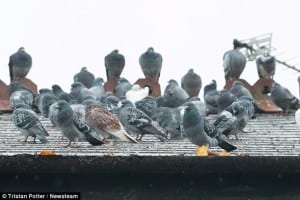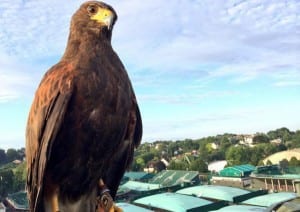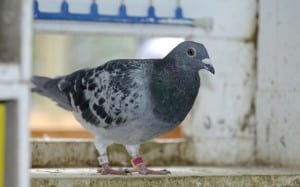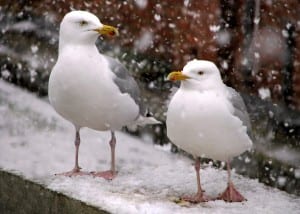
by Pigeon Patrol | Nov 23, 2015 | Bird Netting
 We’re starting to get reports in concerning an unfortunate incident at the Parce offices located in the Facebook Menlo Park, California office complex.
We’re starting to get reports in concerning an unfortunate incident at the Parce offices located in the Facebook Menlo Park, California office complex.
Earlier today, in an effort to expand Parce’s reach within the developer community, it introduced a new service to take on Amazon’s drone delivery service with a new Parce “Pigeon” service, an initiative to deliver app developers new and unique products centered around on-demand delivery.
Details are sketchy for what we understand is now being compared to the great frozen turkey drop accident (as seen in a 1978 television episode of WKRP) where frozen turkeys were dropped out of a helicopter to unsuspecting observers in a publicity stunt gone bad.
Our understanding is that during the official announcement of the new Parce bird based platform, a number of pigeon’s were released inside the company offices. From what we have heard, the pigeons had been cooped up in cages for several hours and upon release, instinct and nature took over as the executives, attendees and bystanders were bombarded with pigeon droppings.
We’ve been unable to get any official comment, however off the record one observer commented “I’ve never seen any bird act with such specific purpose, the pigeons obviously were well trained in their delivery function, but without packages to drop, well…it looked as if they were determined to drop something.”
We understand no-one was hurt, however Menlo Park area dry cleaning companies were reporting record traffic. We’ll update this report as we learn more.
About Pigeon Patrol:
Pigeon Patrol Products & Services is the leading manufacturer and distributor of bird deterrent (control) products in Canada. Pigeon Patrol products have solved pest bird problems in industrial, commercial, and residential settings since 2000, by using safe and humane bird deterrents with only bird and animal friendly solutions. At Pigeon Patrol, we manufacture and offer a variety of bird deterrents, ranging from Ultra-flex Bird Spikes with UV protection, Bird Netting, 4-S Gel and the best Ultrasonic and audible sound devices on the market today.
Voted Best Canadian wholesaler for Bird Deterrent products four years in a row.
Contact Info: 1- 877– 4– NO-BIRD (www.pigeonpatrol.ca)

by Pigeon Patrol | Nov 22, 2015 | Bird Netting
 HOLLISTER, Calif. –
HOLLISTER, Calif. –
Another Central Coast city is resorting to raptors to get rid of nuisance birds. Instead of hiring a master falconer like Pacific Grove, Hollister city leaders invested in a loudspeaker device. Throughout the day, the sounds of raptors and other birds in distress are blasted through speakers at the Briggs Building.
“We’ve been able to remove the pigeons from the building from the past few weeks and some of the buildings downtown I’ve noticed other city facilities and pigeons aren’t over there either. So it’s kind of worked in this general location,” Hollister City Manager Bill Avera said.
Unlike Pacific Grove, which contracted with a master falconer to walk the downtown corridor with hawks and falcons, the sounds are enough to deter pigeons. Avera said that once the pigeons are conditioned to stay away, there will be fewer sounds.
About Pigeon Patrol:
Pigeon Patrol Products & Services is the leading manufacturer and distributor of bird deterrent (control) products in Canada. Pigeon Patrol products have solved pest bird problems in industrial, commercial, and residential settings since 2000, by using safe and humane bird deterrents with only bird and animal friendly solutions. At Pigeon Patrol, we manufacture and offer a variety of bird deterrents, ranging from Ultra-flex Bird Spikes with UV protection, Bird Netting, 4-S Gel and the best Ultrasonic and audible sound devices on the market today.
Voted Best Canadian wholesaler for Bird Deterrent products four years in a row.
Contact Info: 1- 877– 4– NO-BIRD (www.pigeonpatrol.ca)

by Pigeon Patrol | Nov 21, 2015 | Animal Deterrent Products, Bird Deterrent Products, Bird Netting, Pigeon Patrol's Services, Pigeon Spikes
 FRANKFURT—The glass-enclosed newsstand on platform 102 at Frankfurt Central Station has bird decals on its doors to ward off errant pigeons. That’s nothing unusual, except the newsstand sits three stories underground.
FRANKFURT—The glass-enclosed newsstand on platform 102 at Frankfurt Central Station has bird decals on its doors to ward off errant pigeons. That’s nothing unusual, except the newsstand sits three stories underground.
“You expect rats or mice, but pigeons?” said traveler Ingeborg Striebl, watching one of the birds peck at crumbs that missed a trash bin. “How do they get down here? Do they come with the train?”
Europe has millions of pigeons. London’s Trafalgar Square is carpeted with them. They swarm San Marco’s square in Venice and the steps of Milan’s cathedral. But those sites are all above ground.
The pigeons of Frankfurt’s Central Station navigate underground corridors like commuters on autopilot. They come and go from the deep suburban-rail platforms by flying inches above escalator riders.
“It is striking to see them down here,” said rider Rosario Scolaro, standing near four pigeons strutting around the newsstand. “One doesn’t expect to see them under these dim ceilings.”
Frankfurt Central is hardly the world’s only city station with pigeons. But representatives for New York’s train stations and the London Underground say the birds aren’t too numerous—and don’t make too many feathers fly.
But in Frankfurt, the station’s open structure and easy access to lower levels have turned it into a subterranean aviary.
The rush-hour nature show isn’t exactly a welcome one. In an attempt to minimize the birds presence in the 19th-century landmark, station operator Deutsche Bahn Service has festooned it with nets, wires and spikes. Nothing has worked. A spokeswoman for the service calls pigeons “the plague.”
And so they keep coming, flying in every direction. It’s in their blood. Their dexterity navigating underground tunnels today “links to their heritage living in cliffs,” says Steve Portugal, a zoologist at Royal Holloway, University of London. Pigeons are the descendants of rock doves—seaside birds that live on precipices and in caves.
That helps to explain why, to pigeons, leafy green trees are for the birds. They prefer to nest on ledges, roofs, beams and other flat surfaces.
“The city perfectly mimics rock doves’ environment,” says Dr. Portugal.
Slow and rotund, pigeons struggle to soar. Their shape is adapted to short bursts of flight, often in tight spaces. Physiognomy and heritage mean pigeons, unlike other birds, have no qualms about dim lighting or spelunking.
“They’re happy to go into dark tunnels,” says Dr. Portugal. “They see a hole in a building and think ‘OK I can do this.’ ” A larger, more graceful bird in a similar spot “couldn’t get the oomph behind it to get back out.”
Humans and other objects pose no obstacle. “Sometimes they fly past at a hair’s breadth,” said Ms. Striebl, the traveler, as a pigeon swooped along the platform toward a tunnel.
Pigeons aren’t just nimble. They’re smart, too. Zoologists say they can count, solve simple puzzles and distinguish between colors and individuals.
“Pigeons could learn to tell a Picasso from a Matisse if you trained them enough,” said Luc-Alain Giraldeau, an expert on pigeons and dean of the Faculty of Science at the University of Quebec. “Some have learned to wait for automatic doors to open,” he said. “Some have learned to operate automatic doors.”
And while people grumble about “flying rats,” few actually want a pigeon-free city, says Peter Havelka, a zoologist at Karlsruhe’s Natural History Museum. Pigeons are part of the collective unconscious, he contends, inextricably bound up with positive associations.
Pigeons were among the first domesticated animals; many instinctively return to their owners. People bred them for food and used their droppings as fertilizer. It’s those droppings, of course, that have soured public opinion—and made some people fearful that the birds will defecate on the fly (they don’t, according to the experts).
“It certainly happens that you have to take cover,” says Annette Drescher, who works at a bakery under the Central Station. To entice pedestrians, the bakery is completely open to the surrounding passageway, which means pigeons also whizz through. “They’re a pest because you never know when something is going to land on you,” Ms. Drescher said.
Dr. Havelka acknowledges humans “have had more profane experiences with pigeons” than as beloved pets. “One falls out of love quickly,” he said. “It’s understandable.”
Frankfurt has managed to keep its greater pigeon population under control with scattered rooftop roosts, known as dovecotes. The oversize birdhouses deter pigeons from nesting in nearby buildings. In an attempt at population control, caretakers also replace some pigeon eggs with convincing fakes—a trick that works until the birds realize their “eggs” aren’t viable. Manager Gudrun Stürmer estimates her team collects about 180 real eggs a month with the switcheroo.
Ms. Stürmer wants to build more dovecotes to help manage the population in “pigeon hot spots” like the station but few Frankfurters are eager to volunteer their rooftops. One bar owner who showed interest later backed out due to sanitation concerns.
“People don’t like them because they’re so much like us,” said Ms. Stürmer. “They’re hungry and there are many of them.” she said.
Still the central station’s pigeons have defenders. “Sometimes they fly right into your face,” said Tesfalem Haile, who works at a juice bar on the main floor. “But they’re a good sign, a symbol of peace.”
About Pigeon Patrol:
Pigeon Patrol Products & Services is the leading manufacturer and distributor of bird deterrent (control) products in Canada. Pigeon Patrol products have solved pest bird problems in industrial, commercial, and residential settings since 2000, by using safe and humane bird deterrents with only bird and animal friendly solutions. At Pigeon Patrol, we manufacture and offer a variety of bird deterrents, ranging from Ultra-flex Bird Spikes with UV protection, Bird Netting, 4-S Gel and the best Ultrasonic and audible sound devices on the market today.
Voted Best Canadian wholesaler for Bird Deterrent products four years in a row.
Contact Info: 1- 877– 4– NO-BIRD (www.pigeonpatrol.ca)

by Pigeon Patrol | Nov 20, 2015 | Bird Netting
 The act of driving into a retail park after 6pm has been made illegal under Asbo-style bylaws introduced by some councils.
The act of driving into a retail park after 6pm has been made illegal under Asbo-style bylaws introduced by some councils.
The sale of lucky charms or heather, or playing music in public has also been banned in some parts of the country after local authorities used new powers to outlaw a range of activities that they consider have a “detrimental effect” on the quality of life for local residents.
Using “public spaces protection orders”, councils can decide to ban an activity in one street while allowing it in other areas. Other examples include holding an open container of alcohol.
About Pigeon Patrol:
Pigeon Patrol Products & Services is the leading manufacturer and distributor of bird deterrent (control) products in Canada. Pigeon Patrol products have solved pest bird problems in industrial, commercial, and residential settings since 2000, by using safe and humane bird deterrents with only bird and animal friendly solutions. At Pigeon Patrol, we manufacture and offer a variety of bird deterrents, ranging from Ultra-flex Bird Spikes with UV protection, Bird Netting, 4-S Gel and the best Ultrasonic and audible sound devices on the market today.
Voted Best Canadian wholesaler for Bird Deterrent products four years in a row.
Contact Info: 1- 877– 4– NO-BIRD (www.pigeonpatrol.ca)

by Pigeon Patrol | Nov 19, 2015 | Animal Deterrent Products, Bird Netting, Pigeon Patrol's Services, Pigeon Spikes
 When I came back to India after a long time and started living in Mumbai, I developed mild wheezing; I dismissed it as my reaction to pollution. Then one day I went up to the terrace of my building and was shocked to see two enormous trays filled with grains mixed with sev (fried stuff made from basan and spices). Birds, especially the friendly neighborhood pigeons and crows feasted on it and the entire floor of the terrace was covered with their droppings. It is at that point I realised that why so many pigeons come to rest near my windows, especially on the base of window grills that project out to give a feeling of space in tiny metropolitan flats.
When I came back to India after a long time and started living in Mumbai, I developed mild wheezing; I dismissed it as my reaction to pollution. Then one day I went up to the terrace of my building and was shocked to see two enormous trays filled with grains mixed with sev (fried stuff made from basan and spices). Birds, especially the friendly neighborhood pigeons and crows feasted on it and the entire floor of the terrace was covered with their droppings. It is at that point I realised that why so many pigeons come to rest near my windows, especially on the base of window grills that project out to give a feeling of space in tiny metropolitan flats.
Naturally, after their fiesta on the terrace, they hover around the building to find some place for their siesta. Some of them even nest and lay eggs, attracting crows who want to eat those.
The fact is that I love birds, and had a cockatiel as a pet for twelve long years, a clean, energetic and dignified fellow (it turned out to be a female at the end) with a tuft on its head. We, the bird and I had become friends, for it thought I am a bird and I thought it has all the human traits. Since I could not bring it to India (ban on exotic birds) and had to put it up for adoption, I missed it terribly and hated to shoo off the pigeons from my window grills. The wheezing continued.
Finally I came to know that my lungs were reacting to the friendly pigeons, but I was lucky that I did not develop a full blown BFD (Bird Fanciers Disease) with symptoms like breathlessness, chills, fever, dry cough and chest discomfort.
The reason behind BFD is that some of us are sensitive to a variety of environmental agents, we repeatedly breathe in making our immune system go for a toss and react violently. In this case, it is the proteins in the bird droppings that float in the air once the droppings dry and become powdery. BFD is not restricted to only pigeons but all the birds and in rare cases keeping a single pet bird can affect the lungs. The symptoms mimic asthma and there is a danger of misdiagnosis. BFD can be diagnosed only with CT scans and X-rays where ‘granulomas’ can be seen (in simple words it can be called localized inflammation). It is usually treated with steroid inhalers.
If not diagnosed or treated properly it can turn complicated with loss of appetite, weight loss and extreme tiredness. It can lead to a very serious condition called ‘fibrosis’ where fibrous tissue (scarring) replaces fine and delicate parts of our lungs (alveoli) where fresh air with oxygen enters our being. More scarring means less fresh air entering our body, and this can be fatal, deadly. Very small children, senior citizens, immune compromised patients are more prone to BFD, and they must wear masks if they live in the midst of pigeons or keep the birds away by not feeding them.
In India we feed birds for two reasons, we love them and also gather religious sentiments with hidden desire to collect ‘good karma’, but are we doing the right thing?
There is one more reason why we must not feed birds on terraces, for their droppings are acidic and over the years can erode the buildings (including the steel), making the structure weak.
The author is a microbiologist and has worked for food and pharmaceutical companies in marketing as well as business development in countries like Germany, India and the United Arab Emirates. She has written articles on ‘health & medicine’ in a leading Marathi newspaper and was also a freelance health columnist for a leading English newspaper in the Gulf for several years. From a young age she was also into writing poetry in Marathi and English, and some of her poems have been published. Now back in India she is a full time writer and pursues farming as a hobby. The first part of her Historical Novel trilogy called ‘Frontiers of Karma – the Counterstroke’ is published (August 2014) by Alchemy Publishers. It is a first novel published on Shivaji Aurangzeb conflict in English where the lives of these mighty men run parallel.
About Pigeon Patrol:
Pigeon Patrol Products & Services is the leading manufacturer and distributor of bird deterrent (control) products in Canada. Pigeon Patrol products have solved pest bird problems in industrial, commercial, and residential settings since 2000, by using safe and humane bird deterrents with only bird and animal friendly solutions. At Pigeon Patrol, we manufacture and offer a variety of bird deterrents, ranging from Ultra-flex Bird Spikes with UV protection, Bird Netting, 4-S Gel and the best Ultrasonic and audible sound devices on the market today.
Voted Best Canadian wholesaler for Bird Deterrent products four years in a row.
Contact Info: 1- 877– 4– NO-BIRD (www.pigeonpatrol.ca)

by Pigeon Patrol | Nov 18, 2015 | 4-S Gel Bird repellent, Animal Deterrent Products, Bird Netting, Pigeons in the News, UltraSonic Bird Control

Seagulls in the Snow by Ron Hill
Two Gulls loving the snow in an Uckfield Garden !!!
Pigeons have been ruffling the feathers of more and more people in recent years.
Last year, the Agri-Food and Veterinary Authority (AVA) received 2,490 complaints about them – mostly about hygiene, environmental issues resulting from their droppings, and concerns over diseases and people feeding them.
There were 2,080 complaints in 2013 and 1,420 in 2012.
The increase has largely been attributed to AVA’s First Responder Protocol implemented in 2012, which includes a 24-hour hotline for reports of animal-related issues.
The Straits Times Forum has also received letters about pigeons pecking on food scraps at coffee shops and hawker centres.
Junior college student Ng J-Cyn said Ghim Moh market is a particular hot spot. Pigeons fly within “inches of diners to peck at crumbs or food waste on the floor”, said the 16-year-old, who is concerned about them spreading diseases. She added: “They also contribute to a very negative dining experience.”
Fellow Forum contributor, Ms Lee Kay Yan, 41, believes the pigeon population will explode unless people stop feeding them.
She said: “Three to five pigeons don’t cause a nuisance but a flock of them do.”
The feeding of pigeons has been banned since 1973 and those caught flouting the rules are fined up to $500. Last year, 60 people were caught doing it, up from just 10 in 2011.
One of the diseases pigeons can spread is psittacosis, a bacterial infection of the lungs with pneumonia-like symptoms.
The bacteria become airborne when the bird droppings dry up and can be inhaled by humans.
Dr Christina Low, medical director of SMG Medical, said thehealth risk to most people is low, although infants, the elderly and individuals who have low immunity “are more vulnerable”.
She advised people to wash their hands thoroughly before meals and reduce pigeon attacks by clearing unfinished food and dirty crockery.
The National Environment Agency (NEA) requires all food shop operators to clean tables promptly and cover rubbish bins. Those who fail to clean tables, for example, can be fined $300 and given four demerit points.
As for Ghim Moh market, the NEA said it has asked the table- cleaning contractor to step up the clearing of tables and crockery.
The agency added that it has so far received only one complaint about pigeons at the market.
Nationwide, it received 35 pigeon-related complaints last year and 36 the year before.
The AVA said it responds to pigeon-related feedback by working with the relevant parties, such as town councils and the NEA.
While poison bait is traditionally used for heavily infested areas that need fast elimination of the birds, a spokesman for pest firm Pest Solute said the use of netting at roof gaps, spikes or a type of sticky gel on window ledges to prevent the birds from nesting is more commonly used.
Food areas are a little trickier and need a combination of these measures, according to Ms Gloria Ngoi, business development manager at bird control firm Mastermark.
These methods, however, are not sustainable if people continue to feed the birds, said Forum writer Ms Lee.
“Preventive measures are better, through good design of buildings to prevent roosting and entry by birds.”
About Pigeon Patrol:
Pigeon Patrol Products & Services is the leading manufacturer and distributor of bird deterrent (control) products in Canada. Pigeon Patrol products have solved pest bird problems in industrial, commercial, and residential settings since 2000, by using safe and humane bird deterrents with only bird and animal friendly solutions. At Pigeon Patrol, we manufacture and offer a variety of bird deterrents, ranging from Ultra-flex Bird Spikes with UV protection, Bird Netting, 4-S Gel and the best Ultrasonic and audible sound devices on the market today.
Voted Best Canadian wholesaler for Bird Deterrent products four years in a row.
Contact Info: 1- 877– 4– NO-BIRD (www.pigeonpatrol.ca)

 We’re starting to get reports in concerning an unfortunate incident at the Parce offices located in the Facebook Menlo Park, California office complex.
We’re starting to get reports in concerning an unfortunate incident at the Parce offices located in the Facebook Menlo Park, California office complex.

 HOLLISTER, Calif. –
HOLLISTER, Calif. –
 FRANKFURT—The glass-enclosed newsstand on platform 102 at Frankfurt Central Station has bird decals on its doors to ward off errant pigeons. That’s nothing unusual, except the newsstand sits three stories underground.
FRANKFURT—The glass-enclosed newsstand on platform 102 at Frankfurt Central Station has bird decals on its doors to ward off errant pigeons. That’s nothing unusual, except the newsstand sits three stories underground.
 The act of driving into a retail park after 6pm has been made illegal under Asbo-style bylaws introduced by some councils.
The act of driving into a retail park after 6pm has been made illegal under Asbo-style bylaws introduced by some councils.


